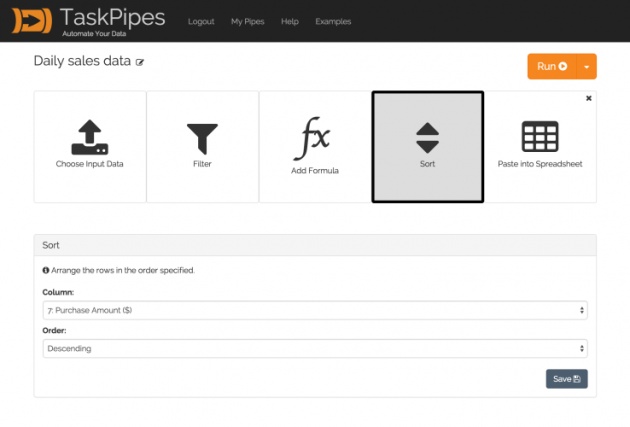
If there was a neat label for startups whose raison d’être is to take the strain out of dealing with other startup services then Taskpipes would be wearing that badge proudly on its lapel.
The YC-backed, U.K. founded b2b startup is attacking what it says is a growing data-management problem for businesses — created by the proliferation and adoption of SaaS platforms. So, in other words, those shiny, cloud-based platforms which promise to streamline your business processes by taking various data-processing tasks off your hands are actually introducing a new headache by fragmenting your data across multiple silos.
That means businesses using multiple SaaS platforms are having to engage in manual data-wrangling when they need to work across these different data buckets, or pull data-sets into other pieces of software for processing. It’s this SaaS-generated data-processing headache that Taskpipes has seized on as another business opportunity.
Its solution, another SaaS platform (obviously), makes it easier for business to grab data from these various third party repositories and set up rules to perform whatever data processing operations they need done. So yes, it’s SaaS platforms all the way down.
“Taskpipes is an online platform that allows you to automate these repetitive and regular time-consuming tasks that people do to manipulate data, to basically connect different platforms together,” co-founder Fraser Atkins tells TechCrunch.
“It automates repetitive data processing tasks that people normally do in Excel. Maybe you have a load of data stuck in your ecommerce platform and the only way you can get that into you accounting software is by downloading a raw CSV data, dumping it into Excel, performing a filter to remove a load of data you don’t want, then sorting the data, reformatting the columns to then upload it into your accounting software.”
“The number of SaaS platforms is just exploding,” he adds. “It’s been totally ridiculous recently. And although each SaaS platform makes that specific aspect of your business more powerful it then means whereas before you ran everything through a few spreadsheets, now you have your data in all these different places.
“When you download the data from one of these platforms and you want to put it into the other one the data’s obviously not compatible.”
Isn’t it a bit hard to automate the bespoke manual pieces of data processing that businesses need to do to tie up their usage of various SaaS platforms? Atkins says not, given that the series of steps businesses are performing to get one set of data into a compatible format for processing elsewhere are always the same — and can therefore be defined as processing rules in Taskpipes to be run automatically after you’ve set them up once (thereby cutting out tedious and time-consuming manual repetition). So its pitch to businesses is time- and efficiency-savings.
Isn’t this much like macros in Excel? It is, concedes Atkins. But Taskpipes is targeting its SaaS platform at people who aren’t capable of writing VBA macros or indeed Python scripts — offering a simple interface that even non-Excel whiz kids in the business should be able to get to grips with.
“We’re like the central node in this network of all your different data. Because whereas maybe five years ago you’d have most of your data in an Excel spreadsheet, maybe a couple of SQL databases, now people have their data across all these different third party platforms so how do I get my data from Mixpanel into Salesforce without having to either spend ages writing the integration code or having to do it manually every single day through Excel.”
It’s also aiming to improve on macros by offering more granular controls. “The problem that macros present is that they’re really opaque, they’re really hard to edit afterwards, and they also can’t do really cool things — you couldn’t set a macro up very easily to run every single day,” he adds. “You couldn’t integrate it with these different platform and so we feel that we bring a lot more functionality than a lot of the existing solutions which people are basically hacking through Excel at the moment.”
The Taskpipes beta was launched around seven weeks ago, and thus far it has a “handful” of paying customers across a range of industries. It currently supports any platform that can export data to CSV format. But next up it’s planning to expand to add integrations with third party platform APIs so it can fully automate pulling data down, excising the need for humans to upload the raw data. So cutting out another step.
“Where we want to move with this, and the next stage we see in product development, is actually providing integrations — so we automatically pull your data from Salesforce, we pull your data from your Shopify store and we automatically upload it to your accounting software, to your Mixpanel account — so that getting data from one platform to another is no longer a hassle,” he says.
“We sometimes explain the concept to people and they come back to us and say ‘oh, that’s basically like IFTTT for data processing isn’t it?’. That’s a nice way of putting it,” he adds.
On the competitor front, Atkins names elastic.io, which self bills as ‘integration platform as a service’ — which is presumably one label for this type of layered service that manages other services. The difference between elastic.io and Taskpipes is the latter is aiming its platform at people with no technical background. “We want to make this completely accessible because the people who are doing this manually at the moment are the people who are the non-technical people. So they are the people we’re targeting,” says Atkins.
Funding wise, Taskpipes has pulled in around $140,000 so far, via YC and also a small portion of that seed coming from the U.K.-based Entrepreneur First accelerator program which it also went through. The team is presenting at YC’s Winter demo day this month, and will be looking to raise more funding to build out those API integrations and scale up its SaaS for managing SaaS use.



